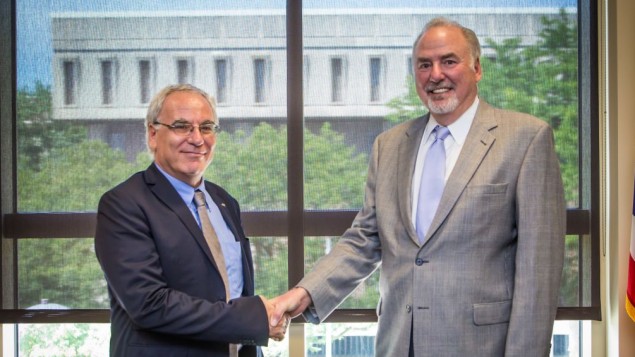
University of Haifa Rector David Faraggi, left, and Cleveland State University President Ronald M. Berkman on Wednesday, August 27, in Cleveland, Ohio. (photo credit: JTA/Courtesy: Cleveland State University)
Anti-Israel activity and especially boycott drives make considerable noise on university campuses, but the record shows that schools that ignore or reject the pressure can profit from relationships with Israeli institutions of higher learning — and not just academically
The agreement was signed by CSU President Ronald Berkman and University of Haifa Rector David Faraggi, who was in Cleveland for a two day visit. The MoU, said CSU Communications Director Kevin Ziegler, “provides an affirmation from both sides that we’re going to work together to make this happen. It’s [a way] of saying we’re serious. That we’re going to treat each other like partners on this and make things happen.”
Ziegler told CSU’s student newspaper, The Cauldron, “Haifa is one of the major cities in Israel. They have an urban campus, and they have a diverse student population like we do. They have full-time students, part-time students, residential and commuter students — [and] they have students who might be going back to school as adults. They share that type of diversity, so it seemed to be a good fit for us to look at programs together.”
Another university already partnering with Israel is Texas A&M, which in 2013 signed a deal with to open a new campus in Nazareth. Texas A&M already has a facility in Israel; the US institution has been working with Ben-Gurion University for several years, and runs an R&D lab with BGU in Beersheba. A delegation of Texas students set to visit Israel in May decided not to come because of “media portrayal of the violence” in the region, according to Texas A&M student newspaper The Battalion, but that doesn’t mean the university is backing away from its commitment to building ties with Israel.
Quite the opposite, according to Texas A&M International Studies Professor Ashley Passmore, who was in Israel this summer for research while the war in Gaza raged. “Today I would feel very confident sending any student to Israel,” Passmore said. “It’s totally different when we ask parents to send their kids to Israel after what they’ve seen over the summer.”
In fact, Texas A&M plans to expand its programs in Israel, Passmore said. “We want to start a Hebrew language program, starting next year,” she said. “And also we’re going to start a Jewish studies program next year as well. This is supposed to complement our Arabic studies program, which we already have. We don’t see them as separate; we want this to be part of curriculum that deals with the Near East.”
Why do universities seek partnerships with Israel, especially given the controversy in the academic world on cooperating with Israeli institutions? One reason is the technology being developed at Israeli schools. One example is a new agreement that Canada’s Eurocontrol Technics Group signed with Ramot, Tel Aviv University’s technology transfer company. Eurocontrol Technics has over the past two years acquired three Israeli subsidiaries in the energy security, verification and authentication sectors.
One of those companies, Global Fluids International (GFI), developed a fuel-marking system to identify where petroleum originates, preventing smuggling aimed avoiding taxes and levies. It’s based on work done at TAU by Professor of Chemistry Fernando Patolsky. Hence the agreement with Ramot, which will help develop commercialization opportunities for GFI’s PetroMark technology.
Summing up the benefit for Eurocontrol of working with Israel — and with TAU specifically — was company CEO W. Bruce Rowlands. “We are very pleased to have partnered with Ramot at Tel Aviv University, an institute that is well known for advancing unique technologies to commercial markets through sponsored research and development agreements with industry, such as the one we have entered into today,” he said. “The sponsorship of this project with Professor Patolsky is an important investment in advancing fuel authentication technology and is a further example of how Eurocontrol remains a leader in the authentication, certification and verification technology markets worldwide.”


